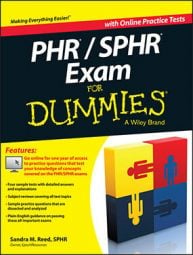You may not have sat for an exam in a long period of time, so the prospect of writing a study plan for the PHR or SPHR exam may be daunting. The good news is that there isn't a single best practice in preparing for this exam. It's the collection of multiple efforts that will help you perform well and reach your goal.
Get started here and expand as you see fit. To create your own study plan, follow these easy steps:
Select your practice exam resources.
Align your preparation with HRCI's exam objectives. Focus on resources that are content driven, such as a textbook or a website. Often a textbook resource also includes functional review questions, flashcards, quizzes, and other study activities that serve you. HRCI recommends that you select multiple resources to prepare for these tests.
Many adults prefer to learn online, and many options for self-paced study are available. Several major universities offer self-paced courses, as do individual authors. Take the time to make a master list of all of the government websites related to employment. Visit them one by one to print out fact sheets on relevant topics.
Identify the areas that you'll study after taking the assessment exams based on the exam weights.
Take one or two assessments prior to beginning your studying efforts to get a baseline of your current readiness. If you scored low on your assessment in an area that carries a heavier content weight on your exam, you should build extra time into your study plan to assure preparedness come exam day.
Study the areas that have the most impact first. For example, consider that the functional area of Risk Management makes up 7–8 percent of the exams, which translates to 12 questions on the SPHR and 14 questions on the PHR — a significantly small area of the exam. Depending on your assessment results, you may want to transfer some of your study time from Risk Management to areas with a denser concentration, such as Business Management and Strategy.
Decide how much time you'll study per week.
Because these exams have seven areas to address (the six functional areas and the core knowledge requirements), you should plan for at least two weeks per functional area, or 14 weeks, depending on your assessment scores. Hence, focus on the content areas that you scored lower on and that have more questions on the exam.
As you study, include practice exams to your overall study calendar. Add at least another three practice exams for review, preferably one per week. And approximately two weeks prior to your exam date, take at least two more exam simulations. Remember that no single preparation resource has all of the content of the PHR and SPHR exams; authors don't have special access to the exams, and out of thousands of possible questions, your exam will be made of just 175. Immersing yourself in practice exams from multiple resources acclimates you to the question wording, but also exposes you to broader exam content, increasing your odds of seeing something familiar on the test.
Select how many weeks you'll study.
HRCI gives you an eight-week and a 12-week sample schedule in its certification handbook, available for purchase on its website. Part with the $25 to purchase it, because it's an excellent resource for building your study plan to the exam content. Many preparers prefer a 14-week schedule because it gives you enough time to allocate two weeks per functional area, plus two weeks to review the core knowledge requirements.
Eight, 12, or 14 weeks refers to the number of weeks until your exam date. So if your exam date is May 1 and you have a 14-week study schedule, you should begin preparing toward the end of January.
Don't forget the exam weights. By two weeks before the exam date, you should be highly interested in your scores in the top three functional areas that make up your selected exam. If you don't have passing scores in those three areas, you have a lot of work to do to be prepared for exam day.
Everyone has different preferences and needs as they prepare for this test, and so there really is no wrong way to study. Do your best to incorporate studying into your everyday activities. For example, if you exercise on a regular basis, make an audio recording using your phone and play it back while on the treadmill. If you're a parent that reads to your infant at night, read aloud from your textbook instead of from the regular bookshelf; your baby won't mind what you read as long as he hears your voice. Or, ask your tween to quiz you with a flashcard deck, showing her how hard you're willing to work to prepare for something you want.

